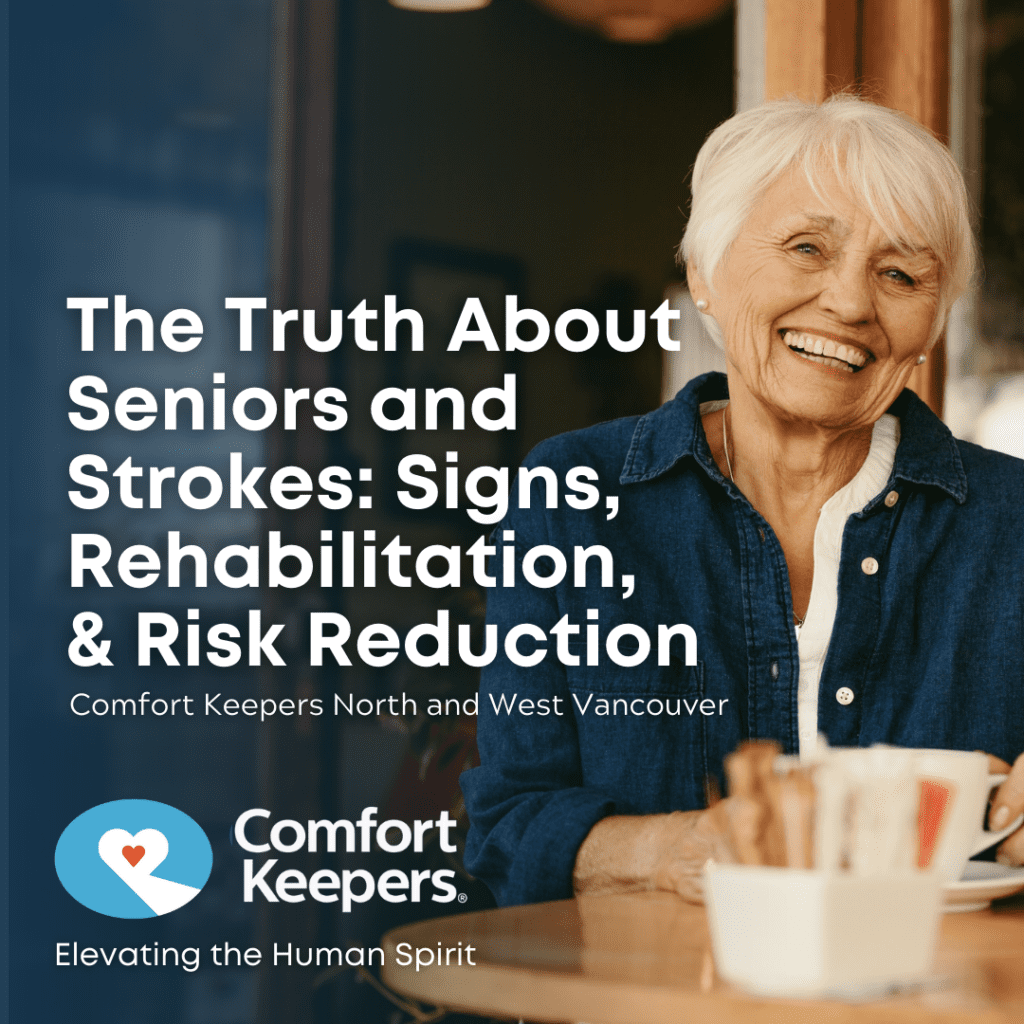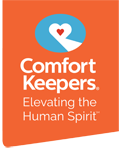The Truth About Seniors and Strokes: Signs, Rehabilitation, and Risk Reduction
Senior Stroke Care | February 16, 2024

What Every Senior in North Vancouver and West Vancouver Needs to Know About Seniors and Strokes
Seniors and Strokes | In Canada, there are more than 50,000 new strokes recorded each year. That’s an average of one stroke every 10 minutes and the majority (about 75%) affect individuals aged 65 and older.
When considering a stroke, certain immediate symptoms may come to mind such as facial paralysis, confusion, or a severe headache. However, there is much more to understanding the intricacies of this medical event and effectively managing it to minimize the possibility of fatality or lasting brain damage.
Seniors and Strokes: Stroke Types
In discussions of strokes, the most commonly mentioned type is an ischemic stroke. This type makes up approximately 80% of all strokes and happens when a blood vessel leading to the brain becomes obstructed, causing a lack of blood flow to certain areas of the brain. This interruption in blood flow results in a deprivation of oxygen and necessary nutrients for the brain. Even just one minute without these vital elements can lead to the death of brain cells.
Another frequently seen type of stroke is called a hemorrhagic stroke, making up 20% of all strokes. This kind of stroke involves blood leaking into the brain and causing harm to neural cells. Typically, this happens when an aneurysm – a weak and stretched portion of an artery wall – ruptures as a result of unmanaged hypertension.
Seniors and Strokes: Signs Of A Stroke
As you may deduce, timing is crucial in the occurrence of a stroke. Treatment delay could lead to permanent brain damage, even if cells do not die immediately. Identifying symptoms can be challenging due to the varying impact of strokes on the brain. This can be particularly subtle for seniors, who are more prone to strokes than any other age group.
Here are indicators to watch out for in yourself or your elderly family member. It’s important for all individuals in regular contact with them to also be familiar with these signs, so they can recognize when it’s necessary to seek urgent medical help.
- Confusion or sudden changes in behaviour
- Partial loss of vision
- Sudden trouble walking and/or dizziness
- Sudden loss of coordination
- Sudden severe headache
- Sudden difficulty speaking or understanding others
- Onset of weakness or paralysis of any part of the body
- Double vision
If you observe any of these indications in your senior family member, it is crucial to act quickly without hesitation or delay. As stated earlier, it is imperative to reach out to emergency services promptly, before any irreversible harm is done to the brain. It is essential to note that for treatments to be successful, the individual must receive a diagnosis within three hours of the onset and arrive at the hospital within an hour.
Seniors and Strokes: Rehabilitation
The recommended rehabilitation for stroke patients varies depending on the severity of their condition. Typically, medical professionals suggest at least one type of therapy, or a combination, to aid in recovery. Physical therapy involves exercises to relearn basic motor skills like walking and lying down. Additionally, occupational therapy helps individuals with daily tasks such as bathing, dressing, eating, and reading/writing. In some cases, speech therapy may also be beneficial for rebuilding communication abilities.
Hypertension is a common cause of strokes, and to prevent this, doctors may recommend medication to keep blood pressure within a healthy range and decrease the likelihood of developing blood clots.
Seniors and Strokes: Stroke Prevention
Over the past few decades, there has been an increase in the survival rate for strokes. According to the American Heart Association, it used to be the fourth leading cause of death in the United States but now ranks fifth. This can be attributed to a better understanding of warning signs and improved treatment methods, as well as education on recommended lifestyle changes.
Here are a few tips for your loved one to lower their risk of experiencing a stroke:
- Manage blood pressure
- Minimize stress (through healthy outlets)
- Quit smoking
- Limit consumption of alcohol
- Exercise regularly (upon physician approval)
- Maintain a healthy weight
- Modify diet to include foods that are low in saturated fat and sodium
- Manage cholesterol levels (consult your physician for options)
Initiating risk reduction involves maintaining a healthy lifestyle. Regardless of any familial predisposition to stroke, it is important to motivate your elderly family member to adhere to these recommendations. Additionally, make sure they routinely visit a healthcare provider for check-ups to pinpoint other potential risks and methods of prevention.
The Best Senior Home Assistance Care in North and West Vancouver is Comfort Keepers®
Our senior home care agency offers in-home care focusing on aging in place. Our services include dementia care, end-of-life care, post-surgery care, and palliative care. Comfort Keepers can assist seniors with living transition services, personal care, companionship care, and more!
Quality and Accredited Elderly Care: Happier, Healthier, and at Home with 24/7 Senior Care Opportunities!
Do you need a home care solution for yourself or a loved one? Have you been thinking about retirement homes and their alternatives as a solution? Comfort Keepers® enables seniors to maintain happy, healthy lives in the comfort of their own homes. In-home care services are available in North Vancouver, West Vancouver, and the surrounding areas.
Comfort Keepers® is a Senior Care Agency That Can Make a Difference with Interactive Caregiving™
Our in-home caregivers ensure our senior clients have the best quality of life. The Interactive Caregiving™ program ensures that a senior’s safety, nutrition, mental well-being, and everyday needs are met. This program brings joy and good health to each client’s home.
Comfort Keepers® North Vancouver and West Vancouver Can Help with In-Home Elderly Care Services!
If you are concerned about the health and well-being of a loved one we can help! Comfort Keepers offers 24-hour care and delivers top-quality and compassionate care for seniors. We are dedicated to safety technology solutions that foster independence and enhance well-being.
Locally Owned and Operated Home Health Care Agency
Our care centers around companionship for seniors. Empathetic care originates from the soul and allows us to meet our client’s requirements. The seasoned in-home caregivers employed by Comfort Keepers are carefully chosen based on their empathetic qualities.
Contact the Comfort Keepers® North Vancouver and West Vancouver office at (604) 998-8806 to learn more about our unique in-home care solutions for seniors.
Comfort Keepers is an Accredited Senior Care Agency in North and West Vancouver, BC
Accreditation is a rigorous process that involves industry experts evaluating an organization’s processes, policies, and procedures. Comfort Keepers® North and West Vancouver has been awarded Exemplary Standing by Accreditation Canada. This achievement recognizes that Comfort Keepers® meets or exceeds the stringent quality standards for Home Care companies established by Accreditation Canada.
References:
- MedicineNet.com. “Stroke Symptoms and Treatment” by Benjamin Wedro, Charles Patrick Davis. Web. 2017.
- NIH Senior Health. “Stroke.” Web. 2017.
- American Heart Association. “About Stroke.” Web. 2017.
Individualized Home Care Options
Long-Term Home Care, 24 Hour Home Care & Short Term Care Options Customized for You





